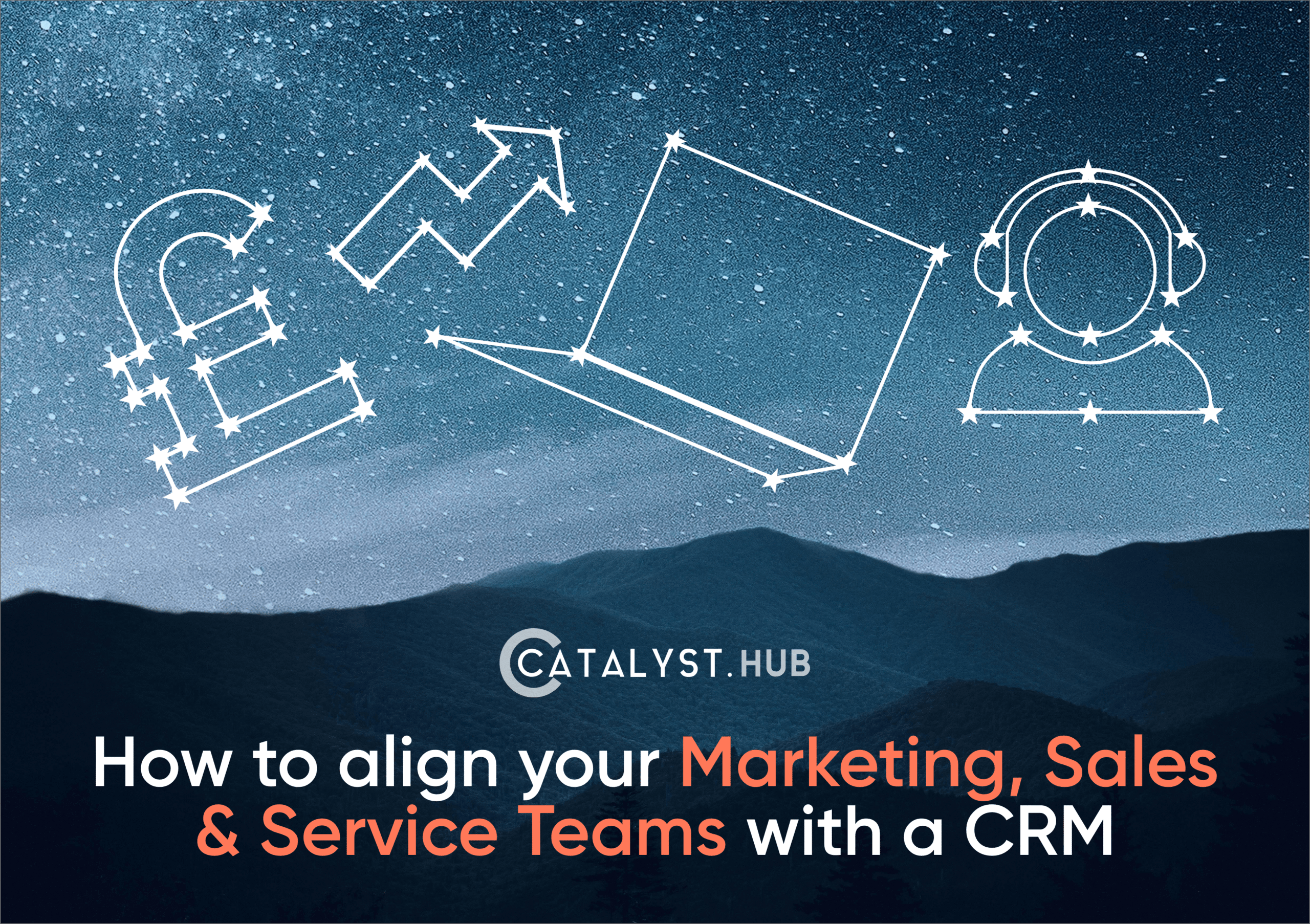There are three things we hear all the time:
“My teams never talk to each other.”
“Sales don’t pass on everything my service team needs.”
“We lose track of lead progress constantly.”
We’ve removed all the bad words from the above.
The truth is, without a process in place to keep your teams aligned across departments, your productivity, communication and general success will take a hit.
Think about your customer journey – what exactly happens when marketing are ready to hand off to sales? How do your salespeople pass new customers/clients over to your service team?
For 1000s of businesses, the answer to these questions is usually a shrug – most businesses do not have a set process for aligning their sales, marketing and service teams. Without a smooth handover process or full visibility of a prospect’s decision-making journey, your people will be inefficient and potentially fantastic leads can and will be lost.
The answer: get yourself a CRM (customer relationship management) solution. In this blog, we’ll discuss the importance of a CRM, and what CRM we recommend for most businesses.
What causes teams to be misaligned?
How long is a piece of string? This is a difficult question to answer, as it can vary on a broad range of factors, however, misalignment is often caused by:
Working from spreadsheets
It’s 2024 – spreadsheets are one of the worst ways you can manage customer information.
Why?
Because spreadsheets get lost, deleted, edited; they might not be saved on the cloud and are often incredibly difficult to analyse. Spreadsheets often cause confusion because there is no single source of truth.
Not only this, but working from spreadsheets encourages people to work in silos, only sharing their data with their immediate team. When using a CRM, data can be accessed by anyone, shared in an instant and analysed more freely.
Poor team collaboration
When teams work in isolation, collaboration suffers. Without a centralised system, team members may not be aware of each other’s activities, leading to duplicated efforts and missed opportunities. Working from home is a huge part of our working lives now, however this increases the likelihood of silos forming and collaboration opportunities being missed.
How many times have you found someone struggling to complete a task, yet unknown to them there’s someone in a different department with all the answers they need.
Without a CRM, silos form and collaboration suffers.
Overwhelming workloads
An overwhelming workload can lead to burnout and mistakes. Without proper tools and processes, your teams may struggle to keep up with their tasks.
CRMs streamline processes and help people be significantly more efficient. More efficient employees are more profitable employees, making a CRM a sound investment for any SME or growing business.
Remember: burnout leads to resignation, and recruitment is incredibly expensive. It’s better to provide the tools and retain your staff than stubbornly stick with your processes that aren’t working for everyone.
Unclear handovers
Unclear handovers between departments can lead to confusion and dropped leads. If sales aren’t aware of where a lead is in the marketing funnel, they may not follow up appropriately, resulting in lost opportunities.
We see it time and time again: business owners frustrated because leads are falling through the cracks. Your business will stagnate if it can’t capitalise on every single opportunity that comes through the door.
A CRM creates a single source of truth, making handovers easier as all information is stored in one place.
Working from multiple separate platforms
There’s nothing worse than different teams working across a variety of unconnected platforms.
If one team works on Software A, and another team works on Software B, but these two pieces of software do not communicate, how will the teams ever keep up with one another?
A CRM provides a complete overview of the customer journey, collating data into one system and ensuring everyone has a solid understanding of what’s going on interdepartmentally. Often, a CRM can be integrated with other platforms. For example, HubSpot comes bundled with out-of-the-box integrations that are easy to set up and can link directly to software you’re already using.
How does a good CRM fix issues of inter-departmental miscommunication?
A good CRM helps in many ways, including:
Centralising data and ensuring consistency
A CRM allows you to centralise all customer data in one place, ensuring consistency and accuracy. This provides a ‘single source of truth’ that all teams can access, improving collaboration and reducing errors.
Improving lead and customer management
Without a CRM, it’s up to individuals to track leads and manage customers. A CRM can automate many of these processes, meaning that there’s zero chance of anything going missing (if the CRM is being used properly). CRMs help businesses to:
- Track leads – Marketing can track the effectiveness of campaigns, and Sales can see the history and status of each lead. This alignment ensures a smooth handoff from Marketing to Sales.
- Improve customer journey – Service teams can view the entire customer journey, helping them provide better support and identify opportunities for upselling or cross-selling.
Developing better customer insights through reporting, segmentation of data and setting lifecycle stages
Right now, do you fully understand what’s going on with your customer journey? Can your sales team see what’s in the pipeline and prepare for leads that will be with them imminently?
If not, a CRM can help. Using a CRM allows you to:
- Establish consistent reporting, ensuring that each member of your team knows what is going on with your customers, leads and ongoing marketing efforts.
- Build out lifecycle stages, allowing your team to track the full contract journey from beginning to end.
Increasing customer satisfaction and retention
Modern customers expect immediate gratification.
By tracking the customer’s overall lifecycle with a CRM, you’re able to tailor content and interactions to them specifically, ensuring that they feel unique and satisfied, boosting the chances of retaining them as a customer.
Automation features help manage renewal processes by identifying contacts at the right stage for follow-up, ensuring no opportunities are missed and taking this key job away from busy sales teams, making retention can be fully automated.
Creating a seamless handover process between teams
A CRM makes the handover from marketing to sales, and from sales to service seamless.
Throughout the sales process, your CRM will gather all data on a contact into one convenient place. This means that, once the contact is sales-ready, your team will have all the information they need on an individual, including:
- What content they have interacted with
- What webpages they have visited
- What emails they’ve received (and read)
- What contact (if any) they have had with members of your team
This means that nothing is missed during handover ever again. Lovely stuff.
What CRM do we recommend?
Choosing the right CRM is a highly personal decision, different CRMs suit different business models.
We recommend having an honest discussion with your team. Ask them to identify gaps in your existing process – where do leads go missing? What frustrations are they living with at the moment?
Your CRM choice should be based on your needs. Consider:
- How much automation you require
- What functionality you need
- How do you expect reporting and sales tracking to work
- How easy is a platform to use
Book demos and share your challenges. During demos, ask questions pertaining to your specific needs and ensure that the CRM has an answer for you.
For our money, HubSpot is the best all-round CRM
Over the years, we’ve worked with clients that use Pipedrive, Zoho, Salesforce and other CRMs, many of these CRMs have their own unique specialisms and benefits, but we’ve found that HubSpot is the most rounded CRM available for general-purpose use.
It’s not perfect for everyone, but it’s proven to be the most reliable and consistent CRM of any we’ve tried, making it our number one recommendation for any business looking to streamline their processes and grow better.
Let’s talk
Whether you’re after tailored advice on choosing a CRM, or you want to talk about streamlining your sales and marketing process, don’t hesitate to get in touch with our friendly specialists for a no-obligation chat.
We’re here to talk whenever you need us. We’ve got broad experience across different CRMs and we can help identify the perfect CRM for you, whether that’s HubSpot or otherwise.

